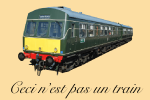Some buses go around displaying "Choo Choo, I'm a Train" text on the destination blind. If that's how they wish to identify then who are we to judge?
When the Supertram network was partially closed for engineering works and bustituted, the replacement buses said 'tram' on the front and I thought, that's rather amusing.
I was trying to envision a way they could get the tram to say 'bus' on the front... But how often is a bus taken off and a replacement tram service provided?


